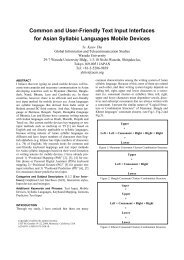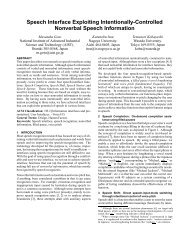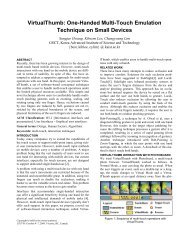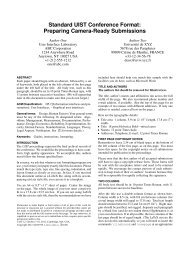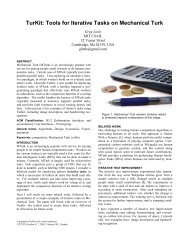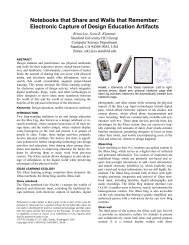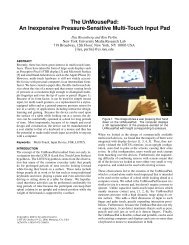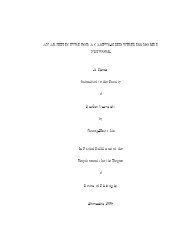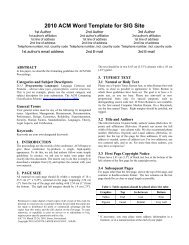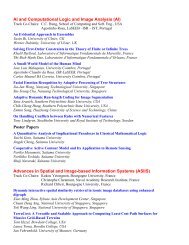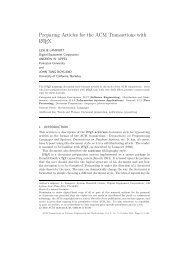API Design Matters Stonebraker and Seltzer - RabbitMQ
API Design Matters Stonebraker and Seltzer - RabbitMQ
API Design Matters Stonebraker and Seltzer - RabbitMQ
Create successful ePaper yourself
Turn your PDF publications into a flip-book with our unique Google optimized e-Paper software.
curmudgeon<br />
Stan Kelly-Bootle, Author<br />
Alloneword<br />
Three years ago, to the very tick, my first Curmudgeon<br />
column appeared in ACM Queue to the rapturous,<br />
one-h<strong>and</strong>ed claps of the silent majority. Since then<br />
my essays have alternated intermittently with those of<br />
other grumpy contributors. With this issue (muffled<br />
drumroll), I’m proud to announce a Gore-like climate<br />
change in the regime that will redefine the shallow<br />
roots of ACJ (agile computer journalism, of which more<br />
anon). The astute ACM Queue Management (yes, there<br />
is such—you really must read the opening pages of this<br />
magazine!) has offered me the chance to go solo. For the<br />
next few Queues, at least, I am crowned King Curmudgeon,<br />
the Idi Amin of Moaners, nay, Supreme General<br />
Secretary of the Complaining Party! “I am Sir Oracle,<br />
<strong>and</strong> when I ope my lips, let no dog bark!” 1 Or rather,<br />
under the new dispensation, I comm<strong>and</strong> you to bark<br />
back via curmudgeon@acmqueue.com with your own<br />
pet peeves or counter-moans, which I promise to print<br />
if printable (subject to as light an editing as the Law<br />
dictates).<br />
I also plan to pose posers <strong>and</strong> ask FUQs (frequently<br />
unanswered questions), as was my wont in the Unix<br />
Review Devil’s Advocate columns of yore (1984-2000). As<br />
then, huge, literally invaluable prizes are offered for your<br />
answers <strong>and</strong> selected responses that meet my unpublished<br />
“Rules & Regulations.” Suffice it to say that the<br />
customary bribes are encouraged; friends <strong>and</strong> relations<br />
enjoy traditional nepotistic advantages (in the old days<br />
my mother inevitably won the white Rolls-Royce convertible);<br />
<strong>and</strong> tedious accuracy scores lower than cunning<br />
disinformation. An ongoing challenge goes out to readers<br />
who encounter risible misprints <strong>and</strong> howlers in the computer<br />
literature, not excluding my own usually deliberate<br />
mishtakes.<br />
Any errors you detect will be judged against the<br />
expected authority <strong>and</strong> inerrancy of the source. Thus,<br />
the many marketeering deviations from the untrampled<br />
snow-white truth will seldom rate highly unless, say,<br />
Gates or Jobs drops a real whopper. I allow new retrospective<br />
findings of false prophecies, but not the well-worn<br />
ones: at one end we have the quite plausible 1947 prediction<br />
by T. J. Watson (three IBM computers will more<br />
Errors,<br />
deceptions,<br />
than meet the world’s<br />
needs) <strong>and</strong>, at the other,<br />
the less plausible Bill<br />
Gates (“640K ought to<br />
be enough for anybody,”<br />
1981), which reflected the sad fact that IBM PC designers<br />
spurned the larger, linear-address space of the Motorola<br />
MC68000 microprocessor in favor of the Intel 8088.<br />
Bill later topped this faux pas: “The Internet? We are<br />
not interested in it” (1993). He also made several other<br />
ill-timed predictions about OS/2 (optimism unjustified)<br />
<strong>and</strong> Java (pessimism unjustified), but I’m loath to cast<br />
bricks: back in 1942 I swore undying love to a certain<br />
Nelly Moorcroft in a Liverpool jigger (back alley) while<br />
the Nazi bombs were falling...but I digress.<br />
A particular source from which mistakes are sought<br />
is the much-cited Wikipedia. Wiki, as in Caesar’s Weni,<br />
Widi, Wiki, 2 <strong>and</strong> ambiguity<br />
has arrived, looked around, <strong>and</strong> conquered.<br />
It has reached the top 10 in the most-visited site list, a<br />
remarkable achievement for a noncommercial project<br />
started in 2001.<br />
Wikipedia, <strong>and</strong> the Web/Internet generally, received<br />
glowing praise from UK Education Secretary Alan Johnson<br />
as “an incredible source for good in education” for<br />
both teachers <strong>and</strong> pupils. “Wikipedia,” he told a Schoolteachers’<br />
Union conference in April, “enables anybody<br />
to access information which was once the preserve only<br />
of those who could afford the subscription to Encyclopaedia<br />
Britannica <strong>and</strong> could spend the time necessary to navigate<br />
its maze of indexes <strong>and</strong> content pages.” He’s correct<br />
about the cost but rather out of date on the “maze,” since<br />
the Britannica is now available online with the usual<br />
search <strong>and</strong> hyperlink features to replace the chore of<br />
heavy page turning. Predictably, some teachers groaned at<br />
the Wiki endorsement, having suffered from the increasingly<br />
blatant plagiarism by students innocently unable<br />
to distinguish fact from opinion <strong>and</strong> deliberate distortion.<br />
Cartoons show children boasting A levels in new subjects<br />
called “Cut <strong>and</strong> Paste” <strong>and</strong> “Drag <strong>and</strong> Drop.” Well, I suppose<br />
they are modern skills to be honed <strong>and</strong> rewarded.<br />
Forget the content, dig the layout!<br />
Continued on page 61<br />
64 May/June 2007 ACM QUEUE rants: feedback@acmqueue.com




